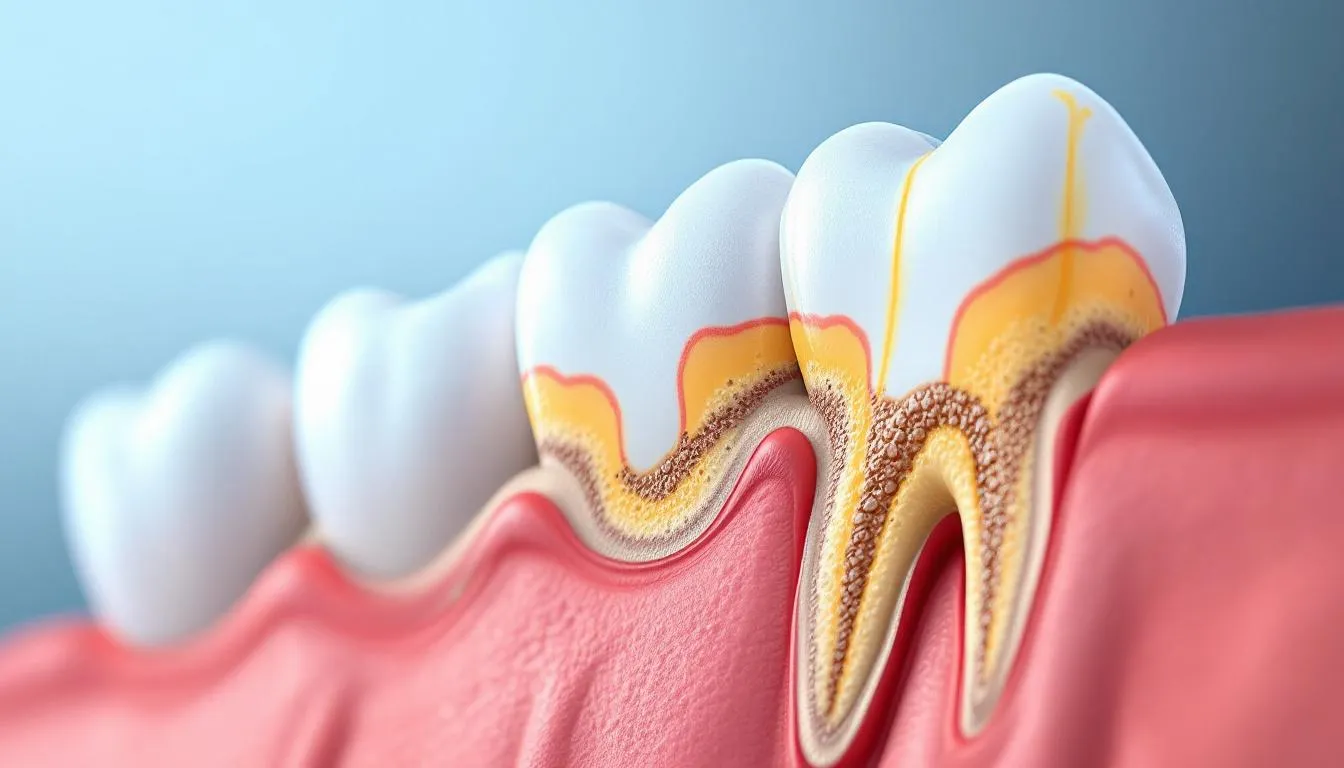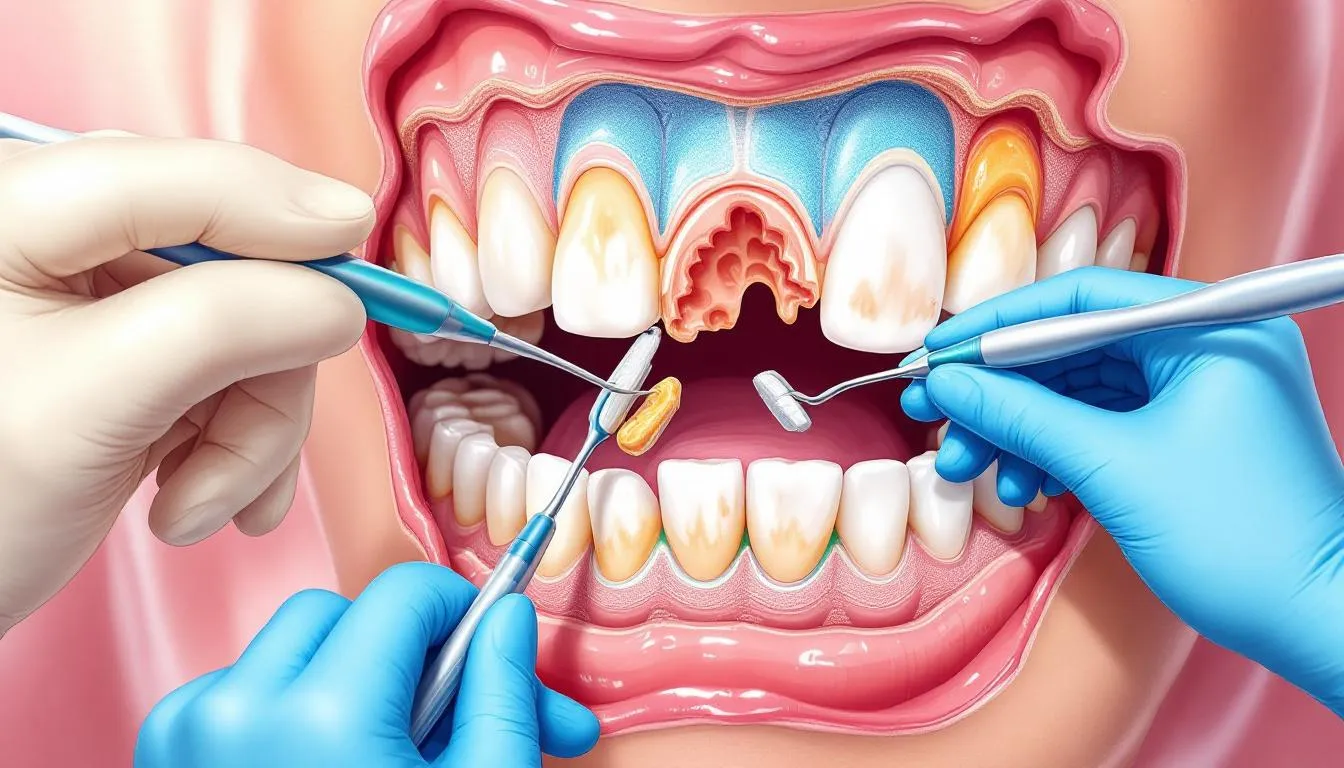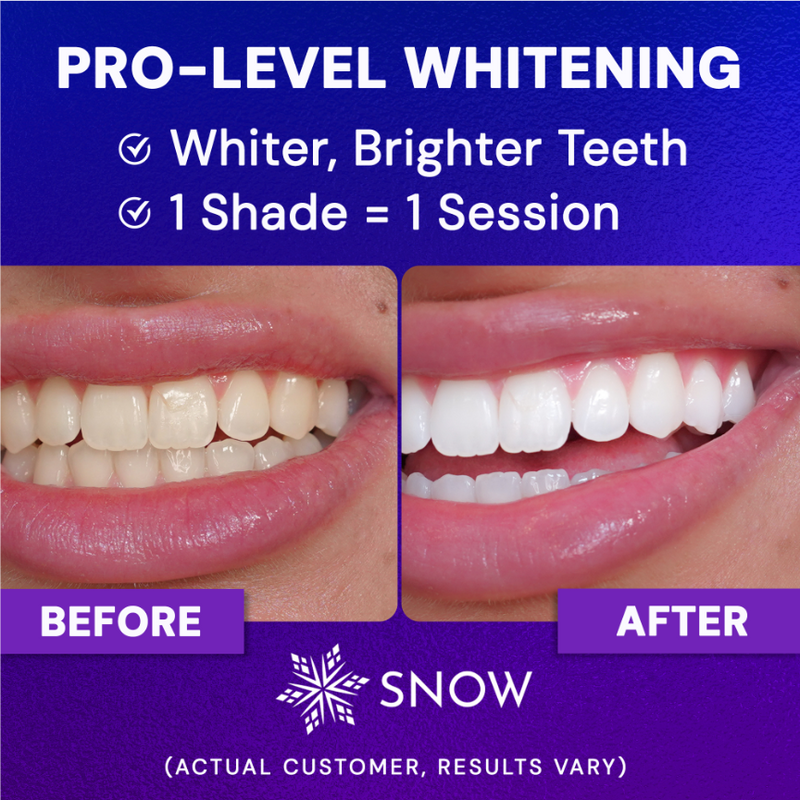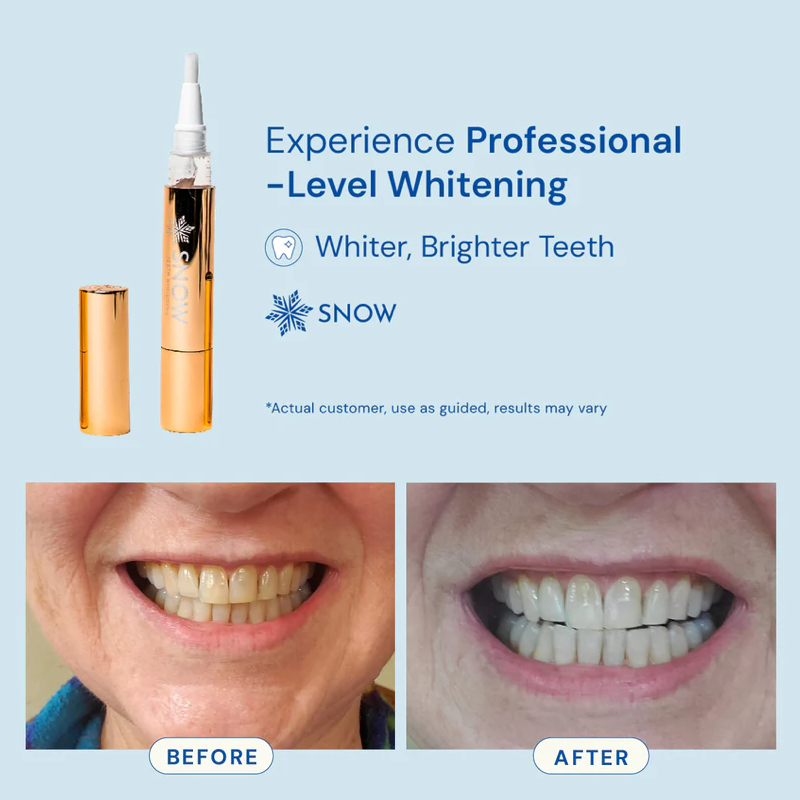Calcium deposits on teeth, also known as tartar or dental calculus, are hardened, mineralized dental plaque that adheres to the tooth surface. This buildup requires professional removal to prevent gum disease and cavities.
In the United States, untreated buildup contributes to tooth decay in over 25% of adults, resulting in an estimated $46 billion in lost productivity in 2015. Among children, plaque-related issues such as calcium buildup on teeth have increased by up to 4.7% in some groups, highlighting the importance of early oral care.
This article explains the causes, symptoms, and preventive steps to help you maintain a cleaner, healthier smile.
Key Takeaways
-
Calcium deposits, or tartar, form when dental plaque hardens due to inadequate oral hygiene and requires professional cleaning for removal.
-
Factors such as diet, saliva composition, and oral hygiene practices significantly influence the formation of calcium deposits on teeth.
-
Ignoring tartar buildup can lead to severe oral health issues, including enamel erosion, gum disease, and tooth decay, making regular dental check-ups essential.
What Are Calcium Deposits on Teeth?

Calcium deposits on teeth, also known as tartar or dental calculus, develop when soft plaque is not removed through regular brushing and flossing. Over time, this plaque combines with minerals in saliva to create hardened calcium buildup on teeth.
This process can begin within 4 to 8 hours after plaque first forms. As it mineralizes, tartar buildup adheres strongly to tooth surfaces, often along the gum line, making it more difficult to remove with standard oral care routines.
Unlike soft plaque, which can be brushed away, calcium deposits are composed of hardened substances such as calcium phosphate and calcium carbonate, along with bacteria and proteins from saliva. These deposits form both above and below the gum line, creating areas that trap bacteria and contribute to ongoing dental issues.
Understanding how these deposits form is a key step in preventing damage to tooth enamel, reducing the risk of gum disease, and supporting long-term oral health.
What Causes Calcium Deposits to Form?
Unchecked calcium deposits on teeth can lead to serious oral health issues. As tartar buildup hardens and spreads along the gum line, it creates a rough surface that attracts more plaque and bacteria. This cycle puts both tooth enamel and gums at risk.
Key effects include:
-
Enamel erosion: Tartar weakens and wears down the protective outer layer of the teeth, increasing the risk of tooth decay and cavities.
-
Gum disease: Hardened calcium buildup on teeth irritates the gums, leading to inflammation and bleeding. If left untreated, it can advance to periodontitis.
-
Bad breath and discoloration: Tartar traps bacteria and food particles, contributing to persistent bad breath and yellow or brown staining.
-
Tooth sensitivity and decay: As tartar breaks down enamel and irritates soft tissue, it can cause pain, decay, and eventually tooth loss.
Severe calcium deposits below the gum line can result in receding gums, bone loss, and the loosening of teeth. These outcomes are preventable with regular dental care, proper brushing habits, and early intervention from a dental hygienist.
What Are the Health Risks of Tartar Buildup?
Left untreated, calcium deposits on teeth can trigger a range of serious dental issues. As tartar buildup hardens along the gum line, it erodes protective barriers, allowing bacteria to flourish. This weakens tooth enamel, inflames gums, and contributes to long-term damage.
Tartar significantly increases the risk of tooth decay. In fact, studies show that about 31% of adults worldwide have untreated tooth decay, often linked to ongoing plaque and tartar accumulation. The rough surface of tartar attracts more bacteria, compounding the risk of enamel erosion and cavity formation.
One of the earliest and most common signs of gum disease caused by tartar is gingivitis. Nearly 50% of adults over 30 suffer from some form of gum disease, making it a leading cause of tooth loss globally. If left unchecked, tartar-induced inflammation can progress to periodontal disease.
Periodontitis affects more than 1 billion people worldwide. It leads to gum infection, bone loss, and eventual tooth loss, with broader implications for systemic health. Chronic gum disease has been linked to increased risk for cardiovascular disease and diabetes.
Other key effects include:
-
Persistent bad breath and gum inflammation contribute to discomfort and social anxiety
-
Discoloration from mineral buildup, often appearing yellow or brown
-
Increased sensitivity due to exposed root surfaces and weakened enamel
-
A higher risk of oral pain and disability, adding to a global economic burden in the billions
While better prevention has reduced hospital admissions for severe tooth decay in children by over 30% in recent years, tartar buildup remains one of the main local factors driving the progression of decay.
Recognizing these risks highlights the importance of proactive oral care and regular visits to a dental hygienist to keep calcium buildup under control.
What Are the Signs and Symptoms of Tartar?
Recognizing the signs of tartar buildup early is key to preventing more serious dental issues like gum disease and tooth decay. As tartar hardens along the gum line, it becomes increasingly difficult to remove without professional care. Below is a breakdown of common symptoms and what they indicate about your oral health:

How Do Dentists Remove Calcium Deposits?

Once tartar, also known as dental calculus, has formed, removing it with regular brushing or even an electric toothbrush becomes nearly impossible. At this point, professional dental intervention is the only effective method to eliminate hardened calcium buildup on teeth. Dental hygienists and dentists use advanced tools and techniques to clean thoroughly, protect the gum line, and restore overall oral health.
Below are the most common professional treatments used to remove calcium deposits on teeth, especially when tartar buildup becomes too hard to manage at home:
Scaling and Root Planing
One of the most commonly used professional treatments is scaling and root planing (SRP), a deep-cleaning method especially effective at removing tartar above and below the gum line. During this procedure, dental professionals use manual instruments and ultrasonic instruments to clean tooth surfaces and smooth root areas.
A study published by the Journal of the American Dental Association (JADA) found that SRP effectively manages chronic periodontitis, which affects approximately 47% of adults over age 30 in the U.S. The procedure significantly reduces inflammation and pocket depths in the gums.
While SRP shows an overall success rate of around 39% in adult patients with periodontal disease, outcomes vary based on the location. Single-rooted teeth, such as incisors and premolars, have success rates of 78–85%, while molars are more difficult to treat, with success rates of around 47% due to their anatomical complexity.
Because SRP may not eliminate all bacteria, particularly in deep pockets or around complex root structures, the dental provider's skill is essential to minimize recurrence. This is why regular maintenance visits are crucial even after treatment.
At-home tip: For ongoing enamel support between visits, consider incorporating SNOW®’s Fluoride-Free Hydroxyapatite Whitening Toothpaste into your daily routine. It gently supports enamel remineralization after professional cleanings, while helping prevent new buildup.
Ultrasonic Scaling
In cases where precision and comfort are top priorities, ultrasonic scaling is a highly effective alternative. This technique uses high-frequency vibrations to dislodge tartar and bacterial biofilm from tooth surfaces. It's especially beneficial in cleaning difficult-to-reach spaces between teeth and beneath the gum line.
Studies show that both patients and providers often prefer ultrasonic scaling for its efficiency and comfort compared to manual scaling. It reduces treatment time and improves patient experience without compromising effectiveness.
Polishing
To complete the cleaning process, polishing is performed as the final step. It smooths the tooth surface, helping reduce bacterial adhesion and preventing plaque from quickly reaccumulating.
Although polishing is primarily cosmetic, leaving teeth feeling smooth and looking brighter, it also supports preventive care. A clean, polished surface makes it more difficult for new deposits to form, particularly when dietary habits include frequent sugary sodas or acidic foods.
Pro Tip: After polishing or any whitening treatment, SNOW®’s Magic Whitening Toothpaste Booster Powder with Hydroxyapatite can be used to maintain brightness while reinforcing enamel, especially on teeth vulnerable to calcium buildup.
How Can You Prevent Calcium Deposits?
Preventing calcium deposits on teeth requires a proactive and consistent oral care routine. From brushing to lifestyle changes, every step plays a role in stopping calcium buildup before it starts.
Daily Brushing and Flossing
One of the most essential starting points in preventing calcium deposits is developing strong at-home oral hygiene habits. Brushing your teeth at least twice a day with a fluoride or hydroxyapatite-based toothpaste helps protect tooth enamel and prevent calcium buildup on teeth.
Opt for a soft-bristled or electric toothbrush to reduce plaque while being gentle on your teeth and gums. Daily flossing is just as essential; it reaches the tight spaces your toothbrush misses and helps remove plaque before it hardens into tartar.
Try SNOW®’s Fluoride-Free Hydroxyapatite Toothpaste for enamel-safe whitening and remineralization.
Shop now for a healthier clean
Regular Dental Checkups
While brushing and flossing are essential, they’re only part of the picture. For deeper cleaning and early detection of primary signs of tartar, professional care is key. Regular visits to your dental hygienist, usually every six months, ensure that hardened calcium deposits are safely removed and your oral health is professionally monitored.
If you're sensitive to in-office procedures, some treatments may require local anesthesia, especially for advanced tartar removal.
Diet and Lifestyle Choices
A balanced diet plays a crucial role in reducing the risk of plaque and tartar formation on teeth. To help prevent plaque formation and maintain oral health:
-
Limit sugar and starch intake.
-
Include fruits, vegetables, and dairy in your diet.
-
Stay hydrated to flush out food particles, neutralize mouth acids, and boost saliva production.
Quitting smoking and other tobacco products can also significantly reduce the risk of tartar accumulation.
At-Home Care Tips for Maintaining Good Oral Hygiene
An intensive home oral hygiene routine is your first line of defense against calcified deposits, plaque buildup, and long-term dental issues. Here’s how to make your everyday habits more effective.
1. Brush Better with the Right Tools
Brushing your teeth at least twice a day is essential. Using an electric toothbrush can dramatically improve cleaning performance, especially in hard-to-reach areas where plaque tends to linger. Unlike manual brushing, electric tools are more effective at removing rough surface buildup that contributes to calcium buildup and tartar formation.
The SNOW LED Whitening Electric Toothbrush combines sonic technology with stain-lifting LED to elevate both cleanliness and brightness.
2. Floss Daily to Disrupt Plaque
Flossing helps eliminate food debris and bacteria between teeth where your toothbrush cannot reach. Daily flossing prevents plaque from hardening into tartar and helps reduce persistent bad breath, which is one of the early signs of gum problems.
For extra freshness and whitening, SNOW’s Charcoal Whitening Floss Picks are a convenient option that fits easily into any routine.
3. Use Mouthwash for a Deeper Clean
A fluoride or hydroxyapatite-based mouthwash is an easy way to neutralize acids, reduce bacteria, and freshen breath. It is advisable to avoid sugary sodas and highly acidic foods, as they increase the risk of tartar and enamel erosion.
4. Hydration Plays a Hidden Role
Drinking enough water is vital for dental health. It helps flush away food particles, supports saliva production, and reduces plaque buildup. A dry mouth creates the perfect environment for calcified deposits to form and stick to teeth.
5. Gentle Options for Sensitive Mouths
If your mouth is prone to irritation or you prefer fluoride-free formulas, choose products that are safe for daily use. SNOW’s Hydroxyapatite Toothpaste supports teeth and gums without harsh ingredients and is designed to help rebuild enamel and prevent sensitivity.
Try SNOW's fluoride-free enamel support
When Should You See a Dentist for Tartar?
Recognizing when to see a dentist is crucial for maintaining oral health. Primary signs that indicate the need for a dental visit include persistent bad breath, swollen or bleeding gums, and visible tartar buildup. Bad breath can result from the presence of tartar and trapped bacteria.
If you notice any of these symptoms, it’s essential to seek prompt care from a dental professional to prevent further complications.
Final Thoughts
Calcium builds up on teeth over time, hardening into dental tartar that can damage enamel, leading to sensitive teeth, gum disease, and other oral health concerns. These deposits often form in hard-to-reach areas and can only be removed by a dental professional. Practicing proper dental hygiene, such as brushing with fluoride toothpaste, flossing daily, and visiting your dentist regularly, helps prevent calcium deposits and supports oral and overall health.
Minimizing plaque formation and making smart eating habits part of your lifestyle are also vital steps to prevent tartar and maintain long-term dental wellness.
For extra support, SNOW’s fluoride-free, enamel-safe collection offers advanced solutions to strengthen, brighten, and protect your teeth from buildup and stains, even for those with sensitive teeth.
Ready for your healthiest smile yet? Explore SNOW’s complete oral care collection and elevate your at-home routine.
Frequently Asked Questions
Got questions about tartar, plaque, or calcium deposits? Find quick answers to the most common oral health concerns below.
What are calcium deposits on teeth referred to as?
Calcium deposits on teeth are called tartar or dental calculus.
Can dental calculus be removed at home?
Dental calculus cannot be safely removed at home; it requires professional scaling by a dentist. Attempting to remove it on your own can cause harm to your teeth and gums.
How quickly can plaque turn into calculus?
Plaque can turn into calculus within about 2 weeks if left untreated. It’s essential to maintain regular dental hygiene to prevent this process.
What serious dental problems can tartar lead to?
Tartar can lead to serious dental problems, including gum disease, periodontal pockets, bad breath, and cavities. Addressing tartar buildup promptly is essential to maintain oral health.
How often should I visit a dentist to prevent tartar buildup?
To effectively prevent tartar buildup, it is advisable to visit a dentist every six months for professional scaling and cleaning, as recommended by the American Dental Association. Regular visits help maintain optimal oral health.





































































